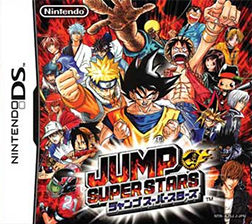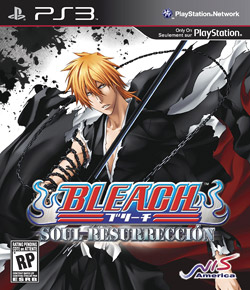 W
WBleach: The 3rd Phantom is a tactical role-playing game for Nintendo DS based on the popular manga written by Tite Kubo. It was released in 2008-2010 and is published by Sega.
 W
WBleach: Blade Battlers (BLEACH ~ブレイド・バトラーズ~) is a series of fighting games released only in Japan for the PlayStation 2 based on the manga and anime Bleach by Tite Kubo. There are two games in the series, both developed by Racjin and published by SCEI. Both games became best-sellers in Japan.
 W
WBleach: The Blade of Fate is a 2D fighting game that features the cast of characters from the Bleach anime and manga. The game features Nintendo's Wi-Fi Connection, allowing players to connect and play against players all over the world. The game modes include story mode, arcade mode, VS mode, training mode, challenge mode, and survival mode, time attack mode and Urahara shop. The game's theme song is "Ichirin no Hana" by High and Mighty Color.
 W
WBleach: Brave Souls is a free-to-play mobile gacha game set in the Bleach universe, developed by KlabGames and published by Konami. It was released for Android and iOS platforms.
 W
WBleach: Dark Souls, known in Japan as Bleach DS 2nd Kokui Hirameku Requiem is the second Bleach game for the Nintendo DS. The game introduces new characters, and adds new moves for the older characters as well as introducing new game modes. Bleach: Dark Souls also includes Hollows of varying sizes, for players to fight. The number of Reifu cards in-game are also increased from the original, and more cards are displayed on the touch screen during battle. The Wi-Fi battle mode has been improved to make it easier to play online. The game's theme song is "Resistance" by High and Mighty Color.
 W
WBleach: Heat the Soul is a series of 3-D cel-shaded fighting games for the PSP based on the manga and anime series Bleach by Tite Kubo. Each installment was developed by Eighting and published by SCEI. All installments have been released only in Japan.
 W
WJ-Stars Victory VS is a crossover fighting video game that combines the universes of several Weekly Shōnen Jump manga series, including former series and some that have been transferred to other magazines. It was released in Japan by Bandai Namco Entertainment on March 19, 2014 for the PlayStation 3 and PlayStation Vita in celebration of Weekly Shōnen Jump's 45th anniversary. It was re-released for western territories as J-Stars Victory VS+ for the PlayStation 4, PlayStation 3, and PlayStation Vita, with an additional Arcade Mode for the international release. It was released in Europe on June 26, 2015 and in North America on June 30, 2015. A follow-up game, Jump Force, released on February 15, 2019 to tie in with the 50th anniversary of Weekly Shōnen Jump.
 W
WJump Force is a Japanese crossover fighting game developed by Spike Chunsoft and published by Bandai Namco Entertainment featuring characters from various manga series featured in Shueisha's Weekly Shōnen Jump anthology in celebration of the magazine's 50th anniversary. The game was released on February 15, 2019 for Windows, PlayStation 4, and Xbox One, and a Nintendo Switch port was released worldwide on August 28, 2020.
 W
WJump Super Stars is a 2D crossover fighting game for the Nintendo DS, based on Weekly Shōnen Jump characters. It was developed by Ganbarion and published by Nintendo. The game was released on August 8, 2005, in Japan and accompanied the release of a red Nintendo DS. A sequel, Jump Ultimate Stars, was released in Japan on November 23, 2006.
 W
WJump Ultimate Stars is a fighting video game developed by Ganbarion and published by Nintendo for the Nintendo DS. It is the sequel to Jump Super Stars. The game was released in Japan on November 23, 2006.
 W
WBleach: Soul Resurrección is an action game based on the manga and anime franchise Bleach for the PlayStation 3. It was released on June 23, 2011 in Japan, July 28, 2011 in Asia, and in Korea on the next day. The fourth Bleach movie, Bleach: Hell Verse, was released on the Japanese PlayStation Store on December 24, 2010. The Japanese visual kei rock band Sid provided the theme song "Ranbu no Melody" , which is also the anime series' 13th Opening Theme, though only for the Japanese version, as the English version is an rearranged instrumental instead.